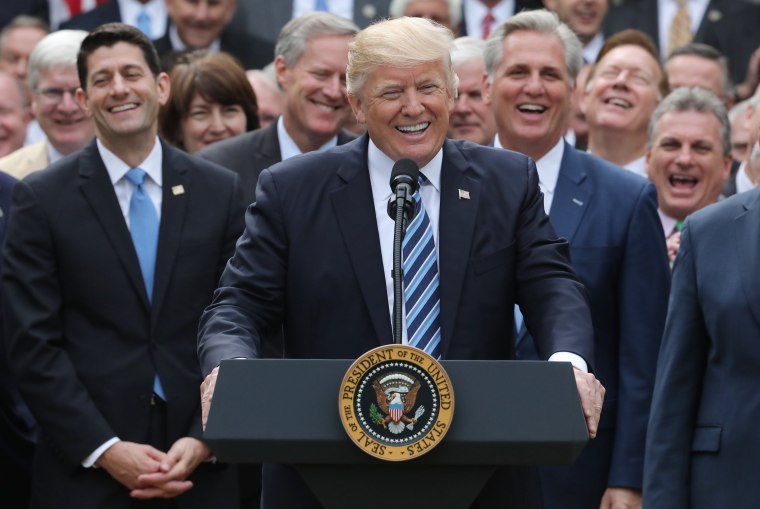The U.S. Chamber of Commerce will today begin a new advertising campaign, airing commercials in key congressional districts, touting the Republicans' unpopular tax plan as a great idea. The strategy isn't subtle: with the GOP facing headwinds ahead of this year's midterm elections, the party's big-business allies are trying to put a positive spin on the Republicans' only meaningful accomplishment.
And at face value, this was entirely predictable. When the package of massive tax breaks for the wealthy and big corporations became law, it stood to reason that GOP officials and their allies would cling to the tax plan like an electoral life preserver, keeping Republicans afloat during a tumultuous storm. Many assumed the party and its partners would talk about little else.
Except in practice, it's not quite working out that way. Each of the party's key predictions about the tax plan has proven false, and polls suggest the law remains unpopular. Donald Trump, meanwhile, who was supposed to be his party's chief cheerleader on the issue, has lost interest in tax breaks.
At an event last month in West Virginia, the president was supposed to read from a carefully crafted script about the greatness of his tax cuts. Instead, he literally threw the script in the air, described his talking points as "boring," and proceeded to complain incessantly about immigration. Something similar happened in Cleveland over the weekend.
Gathering a round-table of steelworkers and small-business people, ostensibly to promote the effects of the Republican tax cut, he ended up celebrating seemingly every other aspect of his presidency, including his poll numbers, which he claimed were on the rise. [...]If there was a recurring theme, however, it was Mr. Trump's insistence that he would restore the balance with major trading partners like China.
A day earlier, Trump was in Texas to speak to the NRA, and again he made only fleeting references to his tax breaks.
Evidently, the president doesn't see his party's tax plan as worth emphasizing ahead of the midterms -- and he's not the only one.
ABC News talked to a Trump loyalist the other day who said, "The only thing that gets the base out is fear of impeachment. You aren't going to do that with tax cuts and deregulation."
Reuters added this morning:
The most vulnerable Republican incumbents in the tightest congressional races in the November elections are talking less and less about the tax cuts on Twitter and Facebook, on their campaign and congressional websites and in digital ads, the vital tools of a modern election campaign, a Reuters analysis of their online utterances shows.All told, the number of tax messages has fallen by 44 percent since January. For several congressmen in tough reelection fights, Steve Knight in California, Jason Lewis in Minnesota, and Don Bacon in Nebraska, messaging is down much more -- as much as 72 percent.
As things stand, voters are far more likely to hear about the Republican tax plan from Democrats than the GOP lawmakers who supported it.
